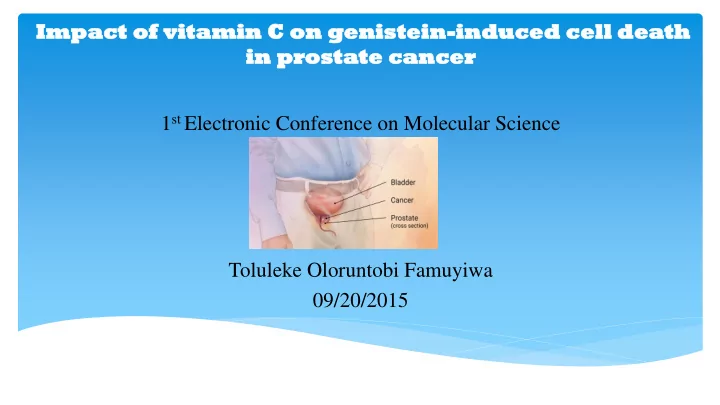

Impact Impact of of vit vitamin amin C C on on geni enistei stein-indu induced ced cell cell dea death th in in prostate prostate cancer cancer 1 st Electronic Conference on Molecular Science Toluleke Oloruntobi Famuyiwa 09/20/2015
Introduct Introduction ion
Sta Stages of es of Prostate Cancer Prostate Cancer
Key y statistics statistics of of prostate prostate canc cancer er Prostate cancer(PCa) is the most common cancer in American men. Estimated 220,800 new cases and 27,540 cancer-related deaths in 2015. About 1 in every 7 men will be diagnosed with PCa during a lifetime. About 6 cases in 10 are diagnosed in men aged 65 or older. The average age at the time of diagnosis is about 66.
Treatment options Treatment options of prost of prostate ate cancer cancer Treatment Non-conventional Conventional Adjuvant therapy /Combination of Chemotherapy two therapies
Adjuv Adjuvant ant thera therapy / combination y / combination of of tw two o the thera rapies pies
Objecti Objective The Purpose of this study was to: Investigate and determine the potential therapeutic additive effect of genistein and vitamin C on prostate cancer
Null Null Hypothesis Hypothesis Combine treatment of genistein and vitamin C will not cause more cells to die by apoptosis than genistein only.
Ma Mate terials ials and and me meth thods ods
Pictures of Pictures of cance cancer cells af r cells afte ter r treat treatment ment
Pictures Pictures of cancer cells af of cancer cells after treatme ter treatment nt
Pictures Pictures of cancer cells after treat of cancer cells after treatment ment 24hrs (40uM vitamin C + 40uM genistein
MTT Assa MTT Assay y result result Fig B Fig A IC-50 of vitamin C = 40uM IC-50 of genistein = 28uM Higher concentration of vitamin C is needed to kill 50% of LNCaP cells.
NBT Assay result
Picture of Picture of LNCaP LNCaP cells cells few min w minute utes s before treatme bef ore treatment nt Cells were seeded into the 96-well MTP at 100ul on the 3 rd day, cells treated when they reached 80% of confluence on 4 th day and MTT assay performed on the 5 th day . 4 th day few minutes before treatment with drug
Pictures of Pictures of LNCaP LNCaP cells 24hrs aft cells 24hrs after er treat treatment ment Control Vitamin C at 40uM concentration
Pictures of Pictures of LNCaP LNCaP cells cells 24hrs af 24hrs afte ter r treatment treatment Gen at 30uM + Vitamin C at 40uM
Third set of Third set of result result 4 th day of cell culture 1 st day of cell culture
MTT assay Level of significance = 0.05 and p value of t-test =0.11
Fluoresce Fluorescence nce assa assay y of c of combination ombination treatment treatm ent sh showing wing qual qualitati itative result e result 80uM genistein + 70uM vitamin C 50uM genistein + 70uM vitamin C
Quantitative result of florescence assay Genistein 10uM + vitamin C 40uM Genistein 70uM + vitamin C 40uM Control
Quantitative result of florescence assay 10uM genistein single treatment 70uM genistein single reatment
Percentage of Apoptosis, Necrotic and Living cells in the treatment groups P value =0.0003 Level of significance = 0.05
Ratio of Apoptosis to Necrosis in each treatment Treatment % Apoptosis % Necrosis % Apoptosis/ %Necrosis Control 0 0 0 10uM of genistein 48 17 2.8= 3 70uM of genistein 43 40 1.1= 1 10uM of genistein + 40uM 48 2 24.8 =25 of vitamin C 30uM of genistein + 40uM 48 4 12 of vitamin C 70uM of genistein + 40uM 62 6 10.3= 10 of vitamin C
Conclusion Conclusion P value of chi-square test = 0.0003 and the level of significance is 0.05 Reject the null hypothesis Fluorescence assay shows different number of apoptotic death at different combination concentrations. Decrease in absorbance reflects a decreased level of intracellular ROS The order of effectiveness of treatment is (Gen 10uM + Vit C 40uM) > ( Gen 30uM + Vit C 40uM) >(Gen 70uM + Vit C 40uM) > > 10uM genistein only > 70uM genistein only.
Ref Refere erences nces America Cancer Society (2013), Vitamin C. American Cancer Society http://www.cancer.org/cancer/prostatecancer/detailedguide/prostate-cancer-key-statistics; 2015. Du J, Cullen JJ, Buettner GR. Ascorbic acid: chemistry, biology and the treatment of cancer. Biochim Biophys Acta (2012) 1826(2):443 – 57. Hoffman R (2011). Screening for prostate cancer. N Engl J Med, 365, 2013-19. James Kumi-Diaka, Saheed Oluwasina Oseni, Toluleke Famuyiwa, Rolando Branly( 2015) Therapeutic impact of vitamin C on the anticancer activities of genistein isoflavone in radio sensitized LNCaP prostate cancer. J. Cancer Prevention and Current Research. Accepted – Research Article. JCPCR-15-RA-166 2015. Parrow NL, Leshin JA, Levine M. Parenteral ascorbate as a cancer therapeutic: a reassessment based on pharmacokinetics. Antioxid Redox Signal (2013) 19(17):2141 – 56. Verim L, Yildirim A, Basok EK, et al (2013). Impact of PSA and DRE on histologic findings at prostate biopsy in Turkish men over 75 years of age. Asian Pac J Cancer Prev, 14, 6085-8. YangY, Karakhanova S,Werner J, Bazhin AV(2013) Reactive oxygen species in cancer biology and anticancer therapy. Curr med chem factor-1/chemokine (C-X-C motif) ligand 12 stimulates human hepatoma cell growth,migration, and invasion. Mol Cancer Res 5(1):21 – 33.
Ackno Acknowledg wledgeme ement nt Department of Biological Sciences of Florida Atlantic University
Recommend
More recommend